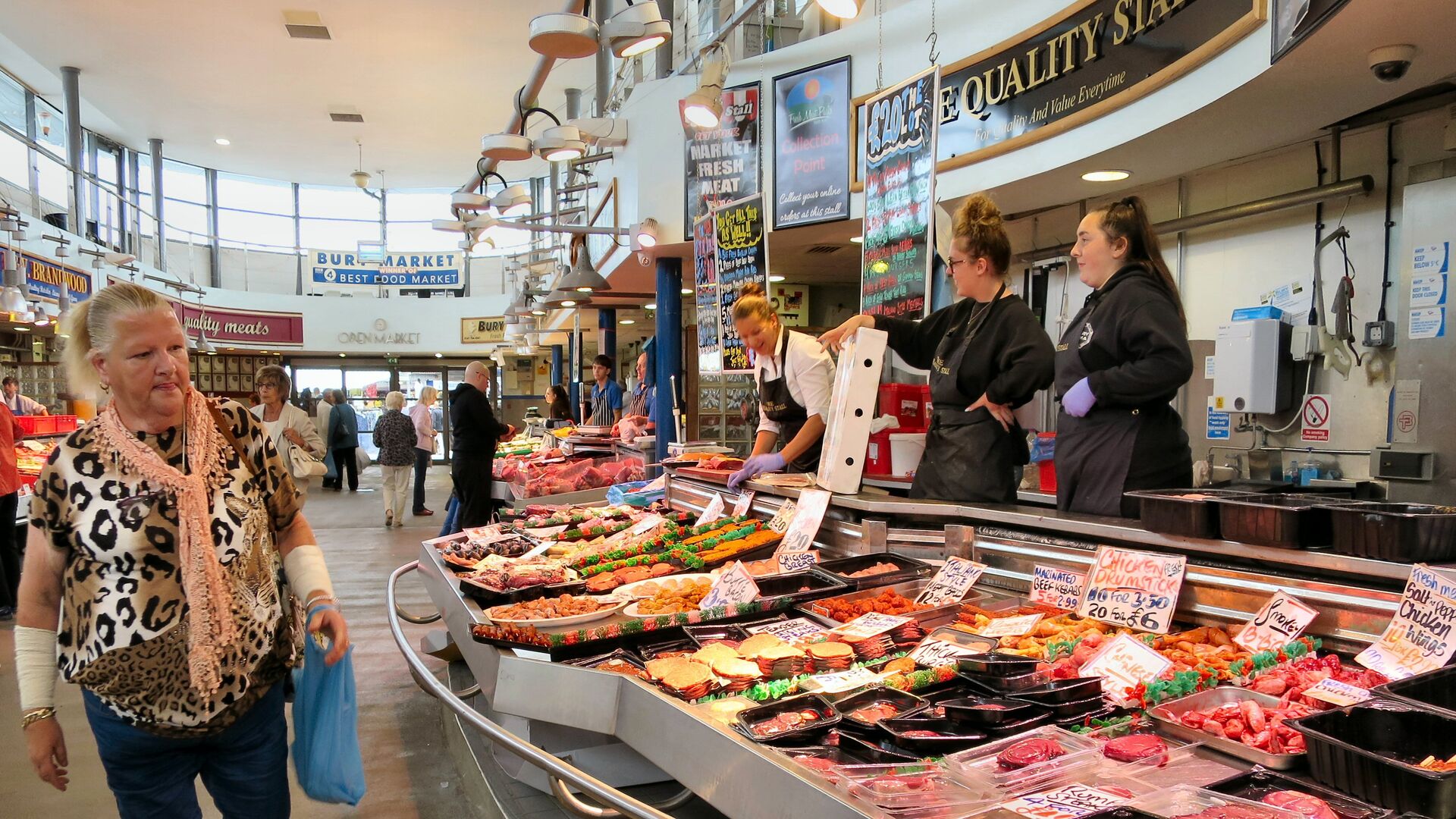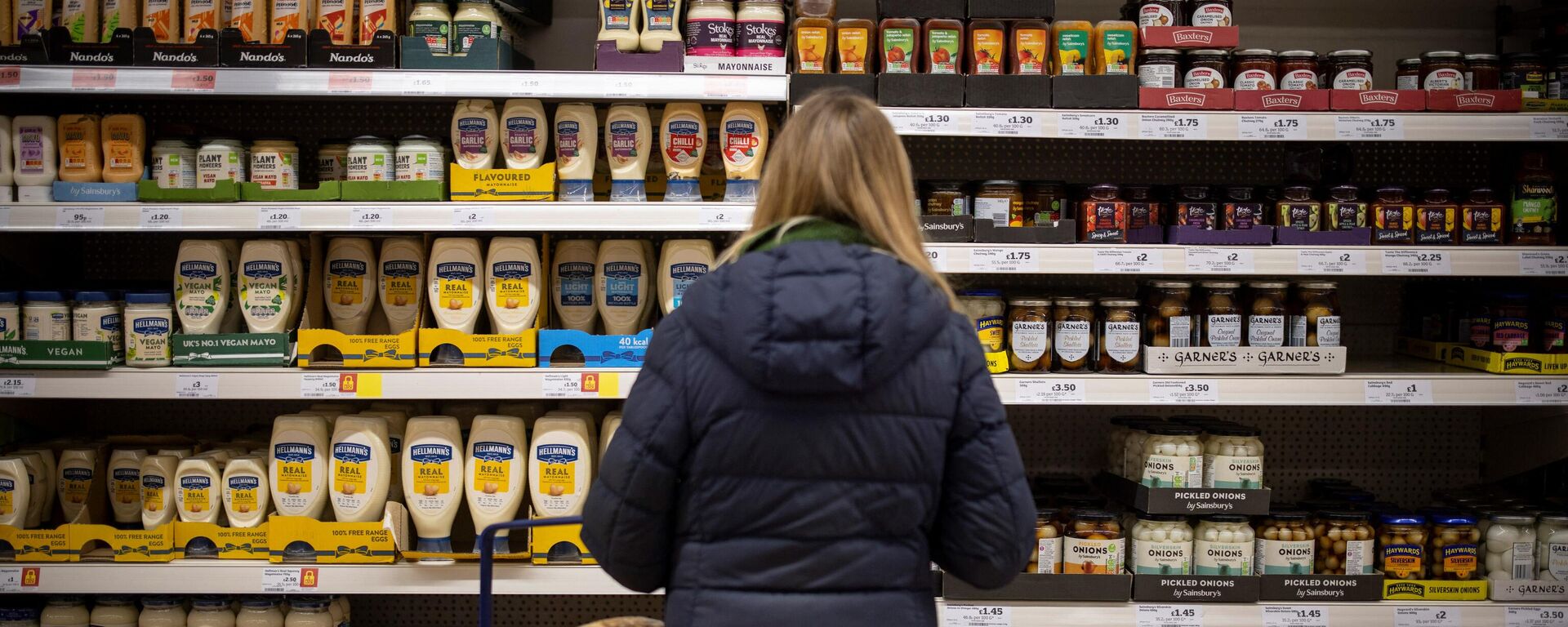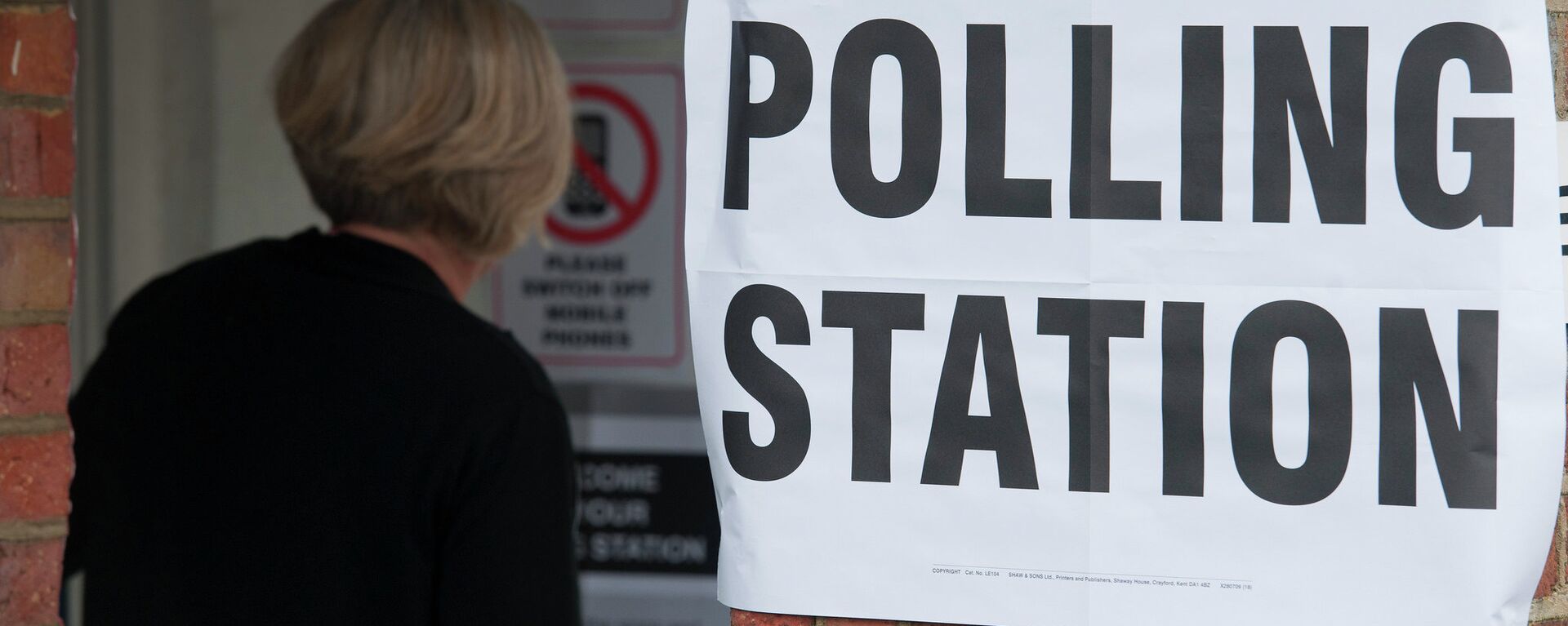https://sputnikglobe.com/20220504/uk-shop-prices-surge-at-fastest-rate-in-over-decade-as-households-brace-for-bumpy-road-ahead--1095249170.html
UK Shop Prices Surge at ‘Fastest Rate in Over A Decade’ as Households Brace For ‘Bumpy Road Ahead’
UK Shop Prices Surge at ‘Fastest Rate in Over A Decade’ as Households Brace For ‘Bumpy Road Ahead’
Sputnik International
As everything has soared in the UK - from energy bills to groceries - and with inflation outpacing the rate at which wages are rising, experts have been... 04.05.2022, Sputnik International
2022-05-04T05:55+0000
2022-05-04T05:55+0000
2023-05-28T15:19+0000
boris johnson
cost of living
uk local council elections
united kingdom (uk)
https://cdn1.img.sputnikglobe.com/img/107297/88/1072978884_0:0:3655:2057_1920x0_80_0_0_cad17c934816f5a99f88905bcee52df2.jpg
Shop prices surged at the fastest rate in more than a decade last month, forcing increasingly more households in the UK to feel the bite of the cost of living crisis, the British Retail Consortium (BRC) revealed.Retail prices shot up from 2.1 percent in March to 2.7 percent in April, according to a survey by the BRC-NielsenIQ Shop Price Index (SPI), published on Wednesday. This was the highest annual rate of inflation recorded by the SPI since September 2011.The BRC-Nielsen Shop Price Index is a monthly measure of UK shop price inflation.Food prices have gone up by 3.5 percent year-on-year, which marks the biggest rise in more than nine years.Dickinson attributed the slightly slowed increase in fresh food, from 3.5 percent in March to 3.4 percent in April, to "fierce competition between supermarkets"."Global food prices have reached record highs, seeing a 13 percent rise on last month alone, and even higher for cooking oils and cereals," the BRC chief executive said, adding:"As these costs filter through the supply chain, they will place further upward pressure on UK food prices in the coming months.”According to Dickinson, retailers would make every effort to keep prices down by “limiting price rises and expanding their value ranges,” however they would invariably be forced to look elsewhere for cost savings.Last week, two supermarket chains - Asda and Morrisons - announced that they would cut the prices of essential items.Dickinson went on to clarify that furniture, electricals and books were seeing the biggest price rises, saying this had been exacerbated by disruption at the world's largest seaport, China’s Shanghai, because of recent fresh COVID-19 lockdown measures.Experts had previously warned that Shanghai's lockdown, set in place after a surge in COVID-19 cases, could have a massive “knock-on effect” in the supply chain.This comes as high inflation, which reached 7 percent in March - the highest for 30 years. Inflation could exceed 8 percent this year, according to officials at the Bank of England, who are expected to raise interest rates to 1 percent, the highest since 2009, as the BoE’s monetary policy committee (MPC) meets on Thursday.As costs of everyday essentials such as energy, transport and food rise faster than household incomes, consumers are likely to curb their spending habits in response, said Mike Watkins, head of retailer and business insight at research firm NielsenIQ.The cost of living crisis, coupled with fall-out from the “partygate” scandal that rocked Downing Street, form an ugly backdrop for Thursday’s local elections across Great Britain.According to a survey carried out by Electoral Calculus jointly with Find Out Now ahead of the vote, the leading opposition Labour party could end up with 3,500 council seats, in a 15 percent lead over the Conservative party, which is predicted to lose as many as 548 council seats.Many also see the local elections as a critical test for Boris Johnson, who has come perilously close to facing a no-confidence vote. Tory rebels supposedly plotting to oust the Prime Minister are waiting for the outcome of local elections as well as the publication of civil servant Sue Gray’s report into “partygate” before submitting their letters of no confidence in the PM to Sir Graham Brady, chairman of the backbench Conservative 1922 Committee.Boris Johnson found himself under fire for being "out of touch" with the cost of living crisis.Interviewed on ITV's Good Morning Britain programme, the PM was told that one 77-year-old pensioner had seen her energy bill rise so high that she has cut down to eating just one meal a day. Furthermore, she was reportedly keeping warm by spending the day travelling on a bus using her free pass.At this point, Johnson took credit for introducing free travel for pensioners during his stint as London mayor, saying:Johnson added that there are "plenty of things more that we are doing" to “make sure that we have people who are in particular hardship looked after by their councils.”However, Labour's shadow work and pensions secretary, Jonathan Ashworth, said it was "utterly shameful" that pensioners had "no choice but to sit on the bus all day to avoid racking up heating bills or are left shivering in blankets and only eating one meal a day".As global energy and fuel prices soared since the beginning of the year, there has been “self-inflicted” volatility coming from the sweeping sanctions applied to Moscow by the US and its western allies, such as the UK, over its special operation to demilitarise and de-Nazify Ukraine.The “shockwaves” from the sanctions would affect the UK, resulting in cutting living standards by £2,500 per household, while feeding into increased inflationary pressure, warned the Centre for Economics and Business Research in March.
https://sputnikglobe.com/20220402/uk-braces-for-protests-over-soaring-cost-of-living-energy-prices-1094421807.html
https://sputnikglobe.com/20220417/poll-public-support-for-russian-sanctions-plummets-in-uk-as-cost-of-living-crisis-starts-to-bite-1094832075.html
https://sputnikglobe.com/20220503/tories-set-to-lose-up-to-550-seats-in-uk-local-election-drubbing-says-poll-1095218113.html
united kingdom (uk)
Sputnik International
feedback@sputniknews.com
+74956456601
MIA „Rosiya Segodnya“
2022
News
en_EN
Sputnik International
feedback@sputniknews.com
+74956456601
MIA „Rosiya Segodnya“
Sputnik International
feedback@sputniknews.com
+74956456601
MIA „Rosiya Segodnya“
boris johnson, cost of living, uk local council elections, united kingdom (uk)
boris johnson, cost of living, uk local council elections, united kingdom (uk)
UK Shop Prices Surge at ‘Fastest Rate in Over A Decade’ as Households Brace For ‘Bumpy Road Ahead’
05:55 GMT 04.05.2022 (Updated: 15:19 GMT 28.05.2023) As everything has soared in the UK - from energy bills to groceries - and with inflation outpacing the rate at which wages are rising, experts have been warning that the country is heading for the worst fall in living standards since the Fifties.
Shop prices surged at the fastest rate in more than a decade last month, forcing increasingly more households in the UK to feel the bite of the
cost of living crisis, the British Retail Consortium (BRC) revealed.
Retail prices shot up from 2.1 percent in March to 2.7 percent in April, according to
a survey by the BRC-NielsenIQ
Shop Price Index (SPI), published on Wednesday. This was the highest annual rate of inflation recorded by the SPI since September 2011.
The BRC-Nielsen Shop Price Index is a monthly measure of UK shop price inflation.
Food prices have gone up by 3.5 percent year-on-year, which marks the biggest rise in more than nine years.
“The impact of rising energy prices and the conflict in Ukraine continued to feed through into April’s retail prices. Non-food products, particularly furniture, electricals and books, have seen the highest rate of inflation since records began,” said BRC chief executive Helen Dickinson.
Dickinson attributed the slightly slowed increase in fresh food, from 3.5 percent in March to 3.4 percent in April, to "fierce competition between supermarkets".
"Global food prices have reached record highs, seeing a 13 percent rise on last month alone, and even higher for cooking oils and cereals," the BRC chief executive said, adding:
"As these costs filter through the supply chain, they will place further upward pressure on UK food prices in the coming months.”
According to Dickinson, retailers would make every effort to keep prices down by “limiting price rises and expanding their value ranges,” however they would invariably be forced to look elsewhere for cost savings.
Last week, two supermarket chains - Asda and Morrisons - announced that they would cut the prices of essential items.
Dickinson went on to clarify that furniture, electricals and books were seeing the biggest price rises, saying this had been exacerbated by disruption at the world's largest seaport, China’s Shanghai, because of recent fresh COVID-19
lockdown measures.
Experts had previously warned that Shanghai's lockdown, set in place after a surge in COVID-19 cases, could have a massive “knock-on effect” in the supply chain.
This comes as high inflation, which reached 7 percent in March - the highest for 30 years. Inflation could exceed 8 percent this year, according to officials at the Bank of England, who are expected to raise interest rates to 1 percent, the highest since 2009, as the BoE’s monetary policy committee (MPC) meets on Thursday.
As costs of everyday essentials such as energy, transport and food rise faster than household incomes, consumers are likely to curb their spending habits in response, said Mike Watkins, head of retailer and business insight at research firm NielsenIQ.
"Unfortunately, customers should brace themselves for further price rises and a bumpy road ahead," warned Helen Dickinson.
The cost of living crisis, coupled with fall-out from the “partygate” scandal that rocked Downing Street, form an ugly backdrop for Thursday’s local elections across Great Britain.
According to a survey carried out by Electoral Calculus jointly with Find Out Now ahead of the vote, the leading opposition Labour party could end up with 3,500 council seats, in a 15 percent lead over the Conservative party, which is predicted to lose as many as 548 council seats.
Many also see the
local elections as a critical test for Boris Johnson, who has come perilously close to facing a no-confidence vote. Tory rebels supposedly plotting to oust the Prime Minister are waiting for the outcome of local elections as well as the publication of civil servant Sue Gray’s report into “partygate” before submitting their letters of no confidence in the PM to Sir Graham Brady, chairman of the backbench Conservative 1922 Committee.
Boris Johnson found himself under fire for being "out of touch" with the
cost of living crisis.
Interviewed on ITV's Good Morning Britain programme, the PM was told that one 77-year-old pensioner had seen her energy bill rise so high that she has cut down to eating just one meal a day. Furthermore, she was reportedly keeping warm by spending the day travelling on a bus using her free pass.
At this point, Johnson took credit for introducing free travel for pensioners during his stint as London mayor, saying:
"The 24-hour freedom bus pass was actually something that I actually introduced."
Johnson added that there are "plenty of things more that we are doing" to “make sure that we have people who are in particular hardship looked after by their councils.”
However, Labour's shadow work and pensions secretary, Jonathan Ashworth, said it was "utterly shameful" that pensioners had "no choice but to sit on the bus all day to avoid racking up heating bills or are left shivering in blankets and only eating one meal a day".
As global energy and fuel prices soared since the beginning of the year, there has been “self-inflicted” volatility coming from the
sweeping sanctions applied to Moscow by the US and its western allies, such as the UK, over its special operation to demilitarise and de-Nazify Ukraine.
The “shockwaves” from the sanctions would affect the UK, resulting in cutting living standards by £2,500 per household, while feeding into increased inflationary pressure, warned the Centre for Economics and Business Research in March.






